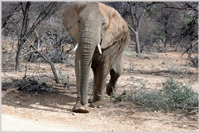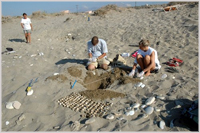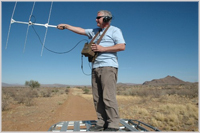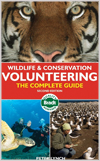♦ Before doing anything it’s important to be clear about the purpose of your conservation volunteer trip – why do you want to do it? Are you interested in the big picture of climate change and deforestation or do you want to help save a specific animal? Do you hope to learn new skills or perhaps reassess your life/career options? Do you want to develop language skills? Do you want to be with a team of likeminded people or immersed in a foreign culture? Are you seeking adventure and out-of-the-ordinary experiences or are you after a holiday with a feel-good factor? You might just want to get out there and back safely; whatever your reasoning, choosing the right company and the right project is crucial if you are to avoid disappointment.
 ♦ Be aware that different volunteer projects appeal to different age groups and lifestyles. In Greece I was sleeping in my own tent and pitching in with cooking and cleaning as well as daytime and nighttime work protecting turtles. In the Amazon I lived on a glorious converted riverboat with air-conditioned cabins, hot showers, a cook and a bar on the top deck was our evening respite after a day in the rainforest.
♦ Be aware that different volunteer projects appeal to different age groups and lifestyles. In Greece I was sleeping in my own tent and pitching in with cooking and cleaning as well as daytime and nighttime work protecting turtles. In the Amazon I lived on a glorious converted riverboat with air-conditioned cabins, hot showers, a cook and a bar on the top deck was our evening respite after a day in the rainforest.
♦ Different organisations offer trips with different emphases, so you need to ensure that the one you choose meets your expectations. Some specialise in long-term gap year-style trips, whereas others cater for those on a fortnight vacation; there are trips led by scientists and others that emphasise working with local communities; some attract a young party crowd, others are more studious and thoughtful. The goals and outcomes of these different types of projects vary enormously, and so will the work. Choose a company that is going to work in the way that suits your expectations.
♦ Remember that websites and brochures are advertising vehicles that only tell half the story – that which the organisation wants you to think. Dubious phrases that suggest more spin than substance include – saving the planet – pristine jungle – a veritable Eden – undiscovered wilderness, such hyperbole is best regarded with suspicion.
 ♦ When selecting an organisation to volunteer with it is important to identify whether they are a charity, whether they design and lead their own projects or are they simply a commercial agent with no more involvement in the project than a high street travel agent has in a hotel they book for your annual holiday. Companies with the highest profile and biggest advertising budgets are usually commercial agents.
♦ When selecting an organisation to volunteer with it is important to identify whether they are a charity, whether they design and lead their own projects or are they simply a commercial agent with no more involvement in the project than a high street travel agent has in a hotel they book for your annual holiday. Companies with the highest profile and biggest advertising budgets are usually commercial agents.
♦ Some key questions to ask before selecting a volunteer trip: • What sort of organisation are you – where does the money go? • What pre-departure preparation is there – can I talk to past volunteers? • Are there names & contact details for the project or is this undisclosed until you’ve paid in full? The best organisations tell you who, what & where before you pay. • What will conditions be like in the field? • What environmental and ethical policies do you have? • What safety procedures are in place – how do you deal with emergencies? • What are your success stories – what have your projects already achieved?
♦ My latest volunteer expedition was to India with the registered UK charity Raleigh International. India is a hard country to be outside the tourist bubble but Raleigh volunteers arrive as a team, there’s an Indian HQ with excellent backup including medical staff, drivers, organisers and local fixers. Their organisation and safety standards really are second to none and a unique feature underpinning all their programmes is personal development – team working, leadership skills and coping with challenges.
 ♦ Working in small teams with volunteer managers and local NGOs, venturers (their term for young volunteers) live amongst rural communities as they work on environmental and community projects before undertaking a challenging trek across country – hiking, kayaking and cycling. It’s aimed at young volunteers aged 18-24 but older volunteers (25+) can also participate as volunteer managers.
♦ Working in small teams with volunteer managers and local NGOs, venturers (their term for young volunteers) live amongst rural communities as they work on environmental and community projects before undertaking a challenging trek across country – hiking, kayaking and cycling. It’s aimed at young volunteers aged 18-24 but older volunteers (25+) can also participate as volunteer managers.
♦ People volunteer for numerous reasons, be it a gap year, a retirement plan, a personal challenge or a holiday. Work can include inputting data, caring for animals, reforestation, wildlife monitoring, coral reef surveys or tracking animals using GPS systems. Volunteers do need to be reasonably fit, but that’s the only real criteria and age is certainly no barrier – I’ve worked with a number of volunteers in their 70s in the past couple of years.
♦ Whether your motivation is destination, a particular species or expanded horizons there is a volunteer project that will suit you but like anything else you might buy you must do your background research and don’t take everything you hear at face value.
 To see where you could go and what you could do, how to plan the perfect trip, inspect company audits, read Peter Lynch’s new book about wildlife & conservation volunteering trips.
To see where you could go and what you could do, how to plan the perfect trip, inspect company audits, read Peter Lynch’s new book about wildlife & conservation volunteering trips.
Wildlife & Conservation Volunteering (Bradt travel guides, 2012)
First published in Woman's World, 2012











